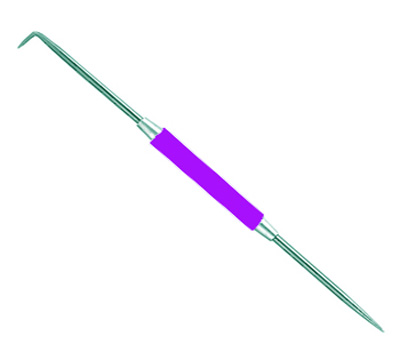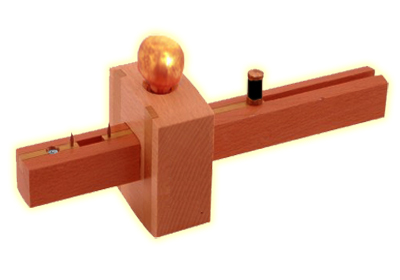Marking is a vital point in woodworking project. The most common woodworking marking tools are pencil, gauge, scriber, marking knives, awl etc. They are used for doing anything such as cutting, shaping, drilling to a piece of wood. You can draw a parallel line to the edges, jig jag line or rounds of a workpiece with them.
Pencils
Pencils are essential marking tool to woodworkers. They have some limitations; for example they cannot mark a sharp line and the mark may be rubbed out. But they have some benefits such as you can easily mark a line. The pencils are great for those cases where accuracy is not important. Most of the cabinet makers use pencil for marking.
Scriber marking tool
In woodworking project a scriber which is a hand tool is used to mark lines on workpieces. This tool is used for marking wood by scratching on the surface to cutting with precision. The lines with the scriber marking tool is more accurate and sharp then the pencils or ink. Often they are used for making mortise, tenon joints, door casings etc. They are made of steel and have a sharpened point which is angle of 30 or 40 degrees. Some scribers may contain a point at both ends.

Scratch awl
The scratch awl looks like a spike which contains a tip. It is used as a point marking tool in woodworking project. It scribes a line across the timber so that a hand saw or chisel can be run properly.
Gauge
The marking gauge is a significant tool among the woodworking marking tools. There are several types of gauge are used for cutting or other operations in woodworking project. Among them the marking gauge, mortise gauge and the cutting gauge are most popular gauges on the market. They scribe a parallel line to a reference edge or surface. The gauge contains a stem/beam, headstock, screw and a scribing point tool such as pin, knife or wheel. The headstock is adjustable and the distance between the pin and headstock can increase or decrease by loosening the thumbscrew. They are more accurate marking tools than the pen or pencil.
Marking gauge
It is a most common type gauge as well as woodworking marking tools. It has a small pin which is also known as spur. The other parts of these tools are stem, stock and adjustable screw. During marking you should run the tools in line with the wood grain. If you run a line against the grain then it would possible to produce inaccurate jig jag line. Normally joiners use this tool for scribing tenons and dovetail shoulder lines. Moreover, sometimes it is also used for marking a rabbet. The stem lengths are available from 9 inches to 10.2 inches. Much larger marking gauges are known as panel gauges.
Mortise gauge
A mortise gauge has two pins where one of them is adjustable relative to each other. It is able to scribble two lines simultaneously including different widths. Normally it is used in mortise and tenon joinery project. Sometimes this gauge may contains a third pin on the opposite side so that it can be used a regular marking gauge. Therefore it is also known as combination gauge. These gauges are available in different stem length from 6 inches to 11.5 inches.

Cutting gauge
The marking gauge with a knife instead of a pin is known as cutting gauge. It is able to mark wood against the grain with accuracy. It can cut clean and precise deep lines in the timber. You can also use this gauge to cut through thin materials like veneer.
Wheel gauges
Wheel gauge contains a round blade instead of a pin to mark a surface. As like cutting gauge it can also mark across the wood grain. For mark out mortises the wheel gauge may also contains two round blades. Then it is known as wheel mortise gauge. The round blade contains in two separate stems. As a result they can be adjusted according to each other.
Panel gauges
The marking gauge which has a longer stem is called panel gauge. The carpenters use these tools to mark large boards to the correct width; even in center of a board. The stem length can be 12 inches to 26 inches.
Marking Knife
Joiners use marking knife to scribe a line so that they can accurately run a hand saw or chisel during making joints or other operations. It is constructed with steel blade and wood or plastic handle. They can able to mark across the grain and the line is accurate than pencils.
Others Woodworking marking tools
Some tools are not directly used as scribing but they are also known as woodworking marking tools. They are used as a guide of above marking tools. Try square, miter square, steel rule, t-bevel are such type of tools; actually they are known as measuring tools. Joiners use the try square to mark out a line at right angles to an edge. Steel rules can be used with marking knife or pencils. They are available in different lengths. Miter square is used to mark at any angles.
One comment